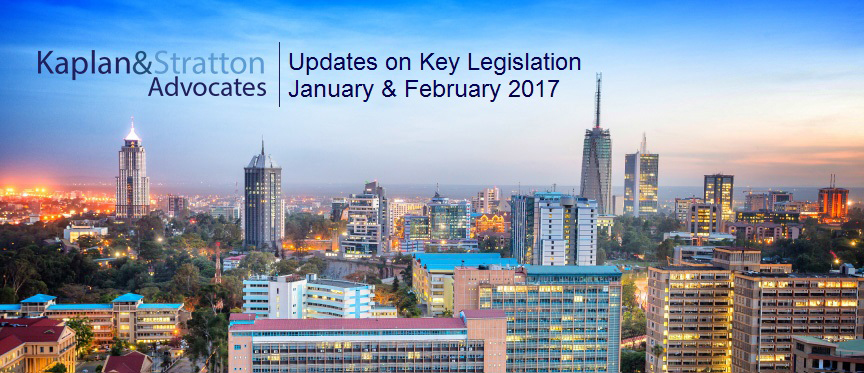Updates on Key Legislation January-February 2017
A list of legislation gazetted in the last two months along with an analysis of the key acts that have come into force, and a roundup of 2016 legislation.

02.03.2017
2016 Legislation List
A review of gazetted 2016 legislation: to keep you up to date on what has changed or is coming up in your sector from a legislative perspective we have compiled a list of the acts, regulations and bills published in 2016 and categorised them by sector. The review can be accessed by clicking here.
January & February 2017 Legislation
In line with the above we have also compiled as one of our new regular features an update on legislations gazetted in the last two months. The review can be accessed by clicking here.
The Bribery Act, 2016
This new Act captures the conduct of individuals, public entities and private entities. The offence of bribery includes the giving, receiving and facilitation of bribes. In addition even if the offence occurs abroad a Kenyan entity or individual can still be prosecuted under the Act.
The Act also provides that any person in a position of authority in a public or private entity is required to report any knowledge or suspicion of bribery to the Ethics and Anti Corruption Commission (the Commission) within 24 hours. Both public and private entities are also required to have anti-bribery procedures in place. However, the Cabinet Secretary in consultation with the Commission, will issue guidelines on this. If you would like to read more on this new Act click here or contact Cosima Wetende at CWetende@kapstrat.com.
The Competition (Amendment) Act, 2016
The amendments to the Act have introduced the concept of ‘buyer power’ and made the abuse of buyer power an offence (buyer power is the ability of one or a group entities in the position of a purchaser of a product or services to exert influence to obtain more disproportionate favourable terms from a supplier). The Act has now clarified that when the Competition Authority requests for information in relation to a sectoral study the recipient of the request is under a legal duty to provide the information. There is now a specific penalty for submitting materially incorrect or misleading information in a merger application.
The Competition Authority can now fine any person who was a party to a merger either a fine not exceeding KES 10 million or imprisonment for a term of not more than 5 years, or both. In addition it can also impose a financial penalty on the merged parties of up to 10% of the preceding year’s income. Finally, the definition of what constitutes an undertaking (i.e. a business) remains substantially unchanged.
There is some debate as to whether this extends to “intended businesses” or an even a dormant company but not only is this illogical, it does not appear to be the intention of the legislators.
For more information on this please contact Amar Grewal-Thethy at AmarGT@kapstrat.com.
Insurance (Amendment) Act, 2016
Takaful insurance is now identified as a regulated product and the Cabinet Secretary is to issue supporting licencing regulations. Takaful insurance is a form of Islamic insurance based on group participation guaranteeing each member. On the issue of capital adequacy the Act introduced a new method of determining capital adequacy which takes into account a variety of risks. It also requires insures to maintain a capital adequacy ratio of 100% for both long term and general businesses.
The Act also now requires that insurers can only have a maximum of 10% of their minimum capital in any one bank or group of banks. Finally, the Act also appears to have increased the scope of capital investment in new insurance businesses. The repealed provision only permitted for investment by ordinary shares the Act introduces investment by ordinary shares with a single face value with voting rights which would be irredeemable and non-cumulative preference shares. If you would like to read more on the implications of the amendments click here or contact Mahesh Acharya at MAcharya@kapstrat.com.
This bulletin is not intended to offer professional advice and you should not act upon the matters referred to in it without taking specific advice. It is not intended to create, and receipt of it does not constitute, a lawyer-client relationship. These regular bulletins provide incisive commentary on recent legal developments. If you have any comments on the bulletin, would like to receive further details on the subject matter or would like to stop receiving such communications from us, please send an email to KS@kapstrat.com or call your usual point of contact at Kaplan & Stratton.
